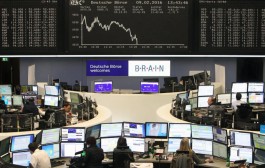Oil prices fell, like other broader stock markets, which also recorded a set of losses, after Israel postponed its ground invasion of Gaza amid diplomatic efforts to secure the release of a larger number of hostages.
The price of Brent crude, which is considered a global benchmark for the oil market, fell below $92 per barrel, while the price of West Texas Intermediate crude approached the $87 level after recording two consecutive weeks of gains.
On the other hand, Israel warned that the actions of the Iranian -backed Hezbollah group could drag neighboring Lebanon into the war zone, while violent air strikes on Hamas in Gaza continue. More than 60,000 people were evacuated in Israel along the border with Lebanon.
Risks to the oil market
Brent crude oil has risen nearly 8% since the attack launched by Hamas on Israel on October 7 due to fears of the involvement of other countries in the conflict, including Lebanon, Iran, and perhaps the United States. The Middle East region provides a third of the world's crude oil supplies, and the main risks to the market lie in the possibility of Washington tightening the enforcement of sanctions on Iranian oil, with Tehran disrupting major shipping routes.
Israel's expansion of the war raises emerging market concerns about Iran
Israel has postponed a strongly expected ground attack on the Gaza Strip - under pressure from the US and European governments - in order to buy time for efforts to secure the release of hostages held by Hamas, a movement designated as a terrorist group by the United States and the European Union. An American mother and her daughter were also released on Friday after Qatar's mediation.
Ip Jun Rong, market strategist at IG Asia, believes that oil markets are experiencing a temporary calm while the focus on humanitarian aid and securing the release of hostages indicates that a potential ground invasion from Israel may be delayed for some time, and may reduce it. The risk of further escalation, at least for now.
Oil price fluctuations
Oil traders consolidated their bullish positions on the war, and during the week ending October 17, hedge funds raised their overall bets that Brent and WTI prices would rise, according to stock exchange data released on Friday. Crude oil price volatility also increased last week.
RBC Capital Markets analysts, including Michael Tran, wrote in a note that crude oil could rise by $10 per barrel or more if the crisis in the Middle East worsens. However, there are no indications on how long and how sustainable this potential rise will be.
But on the other hand, Venezuela's increased oil exports may partially offset the risk premium resulting from the war in the Middle East, after the United States last week took the first steps to roll back the sanctions imposed on the country. Companies such as Chevron, Repsol, and Rosneft are expected to benefit from increased Venezuelan exports.







































